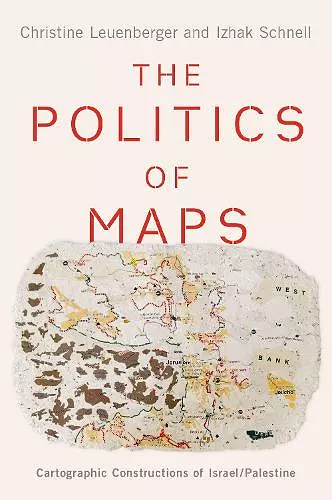The Politics of Maps
Cartographic Constructions of Israel/Palestine
Izhak Schnell author Christine Leuenberger author
Format:Hardback
Publisher:Oxford University Press Inc
Published:17th Sep '20
Currently unavailable, and unfortunately no date known when it will be back

The land between the Mediterranean Sea and the Jordan Valley has been one of the most disputed territories in history. Since the establishment of the state of Israel in 1948, Palestinians and Israelis have each sought claim to the national identity of the land through various martial, social, and scientific tactics, but no method has offered as much legitimacy and national controversy as that of the map. The Politics of Maps delves beneath the battlefield to unearth the cartographic strife behind the Israel/Palestine conflict. Blending science and technology studies, sociology, and geography with a host of archival material, in-depth interviews and ethnographies, this book explores how the geographical sciences came to be entangled with the politics, territorial claim-making, and nation-state building of Israel/Palestine. Chapters chart the cartographic history of the region, from the introduction of Western scientific and legal paradigms that seemingly legitimized and depoliticized new land regimes to the rise of new mapping technologies and software that expanded access to cartography into the public sphere. Maps produced by various sectors like the "peace camps" or the Jewish community enhanced national belonging, while others, like that of the Green Line, served largely to divide. The stories of Israel's many boundaries reveal that there is no absolute, technocratic solution to boundary-making. As boundaries continue to be controversial and the Israeli-Palestinian conflict remains intractable and unresolved,The Politics of Maps uses nationally-based cartographic discourses to provide insight into the complexity, fissures, and frictions within internal political debates, illuminating the persistent power of the nation-state as a framework for forging identities, citizens, and alliances.
This book will benefit readers who are interested in the politicization of culture and science in Middle Eastern conflicts. * Chaoqun Lian, Peking University, China International Strategy Review *
The book provides an excellent survey of how Israelis, and to a much lesser extent, Palestinians, assert their politics through maps. The authors achieve their stated purpose, which is to demonstrate how maps produce reality, rather than reflect it. * Zachary Foster, The Portolan *
This book consistently shows the importance of maps as communication devices, providing insights that could otherwise not be gained, and how information from the field complements potential analyses based on probably unavailable direct observation. Additionally, access to local experts who can provide context to the geographical scene permits a fuller framework of understanding.... Summing Up: Highly recommended. * CHOICE *
The fascinating book written by Christine Leuenberger and Izhak Schnell is the result of longstanding research that took years to appear in the final format of this book. And the result is worth waiting for. Published by Oxford University Press, The Politics of Maps will stay as a reference in the field of cartographic research applied to a rather complex case study, Israel-Palestine. * Daniel Meier, Borders in Globalization Review *
Overall, this fascinating, informative, and critical book is a must-read for anyone interested in political cartography or the Israel/Palestine conflict. The authors reveal a country with a highly professional and technological mapping process, but one that can at times be manipulated as a means of disseminating or emphasising specific political messages. In an era of digitised and Google maps, it is far less easy than in the past to advance one side of the conflict, yet Leuenberger and Schnell make clear just how important mapping and cartography remain within the political process. * David Newman, Times Higher Education *
In this remarkable book, Christine Leuenberger and Izhak Schnell have done a formidable job of demystifying, through the emblematic and concrete case of Israel/Palestine, the role of maps in state building. They establish that maps are merely representations, resulting from the processing of data through cognitive, cultural, and political filters. Their work is essential for understanding how mapping practices, far from being neutral and objective, are formidable tools for defining and legitimizing geographical knowledge and territorial imaginations. * Élisabeth Vallet, University of Quebec at Montreal *
Christine Leuenberger and Izhak Schnell leave no stone unturned as they trace the development and politics of mapping in one of the most contested territories on earth — Israel/Palestine. The two scholars offer a powerful analysis of central role of mapping in colonialism, nationalism, and Zionist nation-building, as well as in the futile attempts to achieve Palestine statehood. The book is a must for students, scholars and observers of this protracted political and cartographic drama. * Oren Yiftachel, Ben-Gurion University of the Negev *
ISBN: 9780190076238
Dimensions: 157mm x 236mm x 23mm
Weight: 680g
244 pages